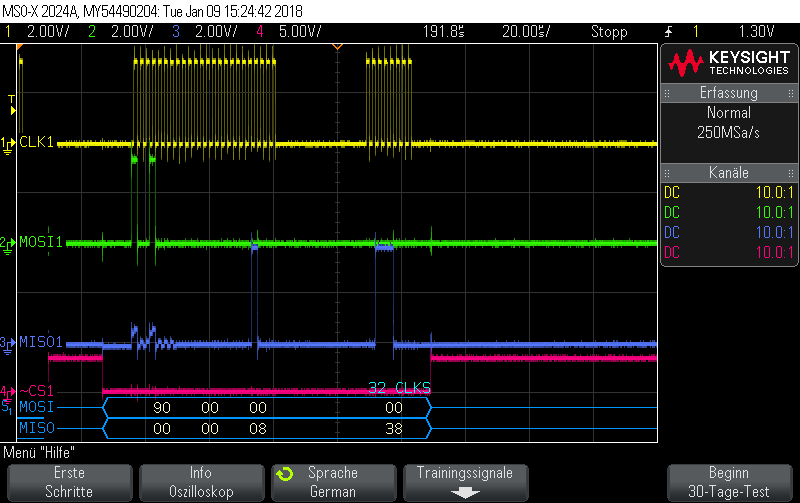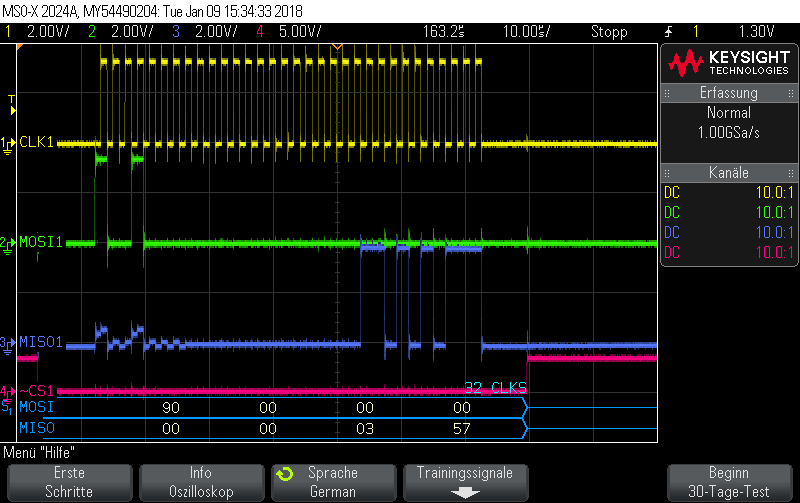Tool/software: Code Composer Studio
Hi there,
first of all my source code:
#include <msp430.h>
#include <stdint.h>
#include <stdio.h>
/**
* main.c
*/
uint32_t TIME[5];
void SPI_init(void);
int t,inter_stat;
void SPI_write_config1(uint8_t,uint8_t);
void SPI_write_config2(uint8_t,uint8_t);
void SPI_write_interrupt_mask(uint8_t,uint8_t);
uint8_t SPI_read_interrupt_status(uint8_t); // ist unnötig kann auch im singlebyte gelesen werden und in der main so konfiguriert
uint8_t SPI_read_singlebyte(uint8_t);
uint32_t SPI_read_longbyte(uint8_t);
int main(void)
{
uint32_t Time1_6;
uint8_t i;
WDTCTL = WDTPW | WDTHOLD; // stop watchdog timer
SPI_init();
SPI_write_config1(0x40,0x03); //write register adress 00h with commands
SPI_write_config2(0x41,0x40);
//inter_stat = SPI_read_interrupt_status(0x02);
//SPI_write_interrupt_mask(0x43,0x00);
Time1_6 = SPI_read_longbyte(0x90); // lesen der TIME 1_6 Register mit auto inc
return 0;
}
uint32_t SPI_read_longbyte(uint8_t adress)
{
uint32_t y = 0;
uint32_t x = 0;
P2OUT &= (~BIT2); // Select Device
while(!(UCB0IFG & UCTXIFG)); // wait for TXBUF
UCB0TXBUF = adress; // send adress für ...
while(!(UCB0IFG & UCTXIFG)); // wait for TXBUF
UCB0TXBUF = 0; // Dummy write to read data
while(!(UCB0IFG&UCRXIFG)); // Wait for RXBUF ready
y = UCB0RXBUF;
x |= (y << 16);
while(!(UCB0IFG & UCTXIFG)); // wait for TXBUF
UCB0TXBUF = 0; // Dummy write to read data
while(!(UCB0IFG&UCRXIFG)); // Wait for RXBUF ready
y = UCB0RXBUF;
x |= (y << 8);
while(!(UCB0IFG & UCTXIFG)); // wait for TXBUF
UCB0TXBUF = 0; // Dummy write to read data
while(!(UCB0IFG&UCRXIFG)); // Wait for RXBUF ready
y = UCB0RXBUF;
x |= y;
while (UCB0STAT & UCBUSY); // Wait for TX complete
P2OUT |= (BIT2); // Unselect Device
return x;
}
void SPI_write_config1(uint8_t adress,uint8_t value)
{
P2OUT &= (~BIT2); // Select Device
while(!(UCB0IFG & UCTXIFG)); // wait for TXBUF
UCB0TXBUF = adress; // send adress to register 00h
while(!(UCB0IFG & UCTXIFG)); // wait for TXBUF
UCB0TXBUF = value; // write a command to register 00h
while (UCB0STAT & UCBUSY); // Wait for TX complete
P2OUT |= (BIT2); // Unselect Device
}
void SPI_write_config2(uint8_t adress,uint8_t value)
{
P2OUT &= (~BIT2); // Select Device
while(!(UCB0IFG & UCTXIFG)); // wait for TXBUF
UCB0TXBUF = adress; // send adress to register 01h
while(!(UCB0IFG & UCTXIFG)); // wait for TXBUF
UCB0TXBUF = value; // write a command to register 01h
while (UCB0STAT & UCBUSY); // Wait for TX complete
P2OUT |= (BIT2); // Unselect Device
}
uint8_t SPI_read_interrupt_status(uint8_t adress)
{
uint8_t rcv;
//uint8_t clear = 0x1F; // Clear interrupt flags??
P2OUT &= (~BIT2); // Select Device
while(!(UCB0IFG & UCTXIFG)); // wait for TXBUF
UCB0TXBUF = adress; // send adress to register 02h
while(!(UCB0IFG & UCTXIFG)); // wait for TXBUF
UCB0TXBUF = 0; // Dummy write to read data
while(!(UCB0IFG&UCRXIFG)); // Wait for RXBUF ready
rcv = UCB0RXBUF;
while (UCB0STAT & UCBUSY); // Wait for TX complete
P2OUT |= (BIT2); // Unselect Device
return rcv;
}
void SPI_write_interrupt_mask(uint8_t adress,uint8_t value)
{
P2OUT &= (~BIT2); // Select Device
while(!(UCB0IFG & UCTXIFG)); // wait for TXBUF
UCB0TXBUF = adress; // send adress to register 01h
while(!(UCB0IFG & UCTXIFG)); // wait for TXBUF
UCB0TXBUF = value; // write a command to register 01h
while (UCB0STAT & UCBUSY); // Wait for TX complete
P2OUT |= (BIT2); // Unselect Device
}
void SPI_init(void)
{
// Enable PIN aktivieren für Register Zugriff//
P6DIR |=BIT5; // OUTput enable Pin for TDC7200
P6OUT |=BIT5; // Output HIGH enable Pin aktiv
// SPI Pins Auswählen//
P3SEL = BIT0 + BIT1 + BIT2;
P2DIR |= BIT2; // PIN2.2 set as Chipselect
P2OUT |= BIT2; // PIN2.2 set the chipselect Pin high
// Konfiguration des SPI-Registers//
UCB0CTL1 |= UCSWRST;
UCB0CTL1 |= UCSSEL_2;
UCB0CTL0 = UCMST+UCMSB+UCCKPH+UCSYNC; // SPI Konfiguration (MasterMode;SynchroneMode;Clock_polarity;MSBfirstMode)
UCB0BR0 = 0x02; // Prescaler
UCB0BR1 = 0;
UCA0MCTL = 0; // No Modulation
UCB0CTL1 &= ~UCSWRST; // disable software reset
//UCB0IE |= UCRXIE; // Enable USCI_B0 RX interrupt
}
i try to read the TIME 1 register with the modified example function from TDC7200_basic_spi_rw: uint32_t TI_TDC720x_SPILongReadReg(uint8_t addr).
the result of this is that the clock stay low after each bit shift command:
after that i try to comment out the bit shift operations after each y buffer receive and all while(!(UCB0IFG & UCTXIFG)); loops. Now i get a what i want a 32 clk cycle whithout any breaks:
My Question is: Is it possible to read my TIME register and the other only read registers with this function and if its possible how i solve it?
and how can I use this function with the autoincrement bit?
thanks in advance
greets Ben



